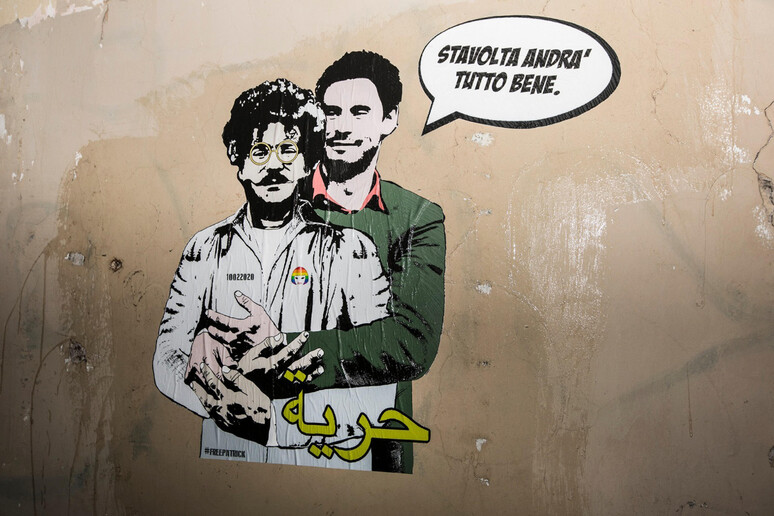A top Italian foreign ministry
official said Tuesday Italy had never stopped pushing for the
truth about Giulio Regeni, the 28-year-old Cambridge doctoral
researcher tortured to death in Cairo in early 2016.
"I want to confirm the all-round commitment of the foreign
ministry and my personal one to contribute to the best of our
abilities to the search for the truth (on Regeni)," foreign
ministry Secretary General Elisabetta Belloni told the Senate.
"We shall not desist from our work which often takes place
behind the scenes without a media spotlight.
"But I can assure you that in the last few years we have
never stopped exerting pressure".
Regeni, a student from Friuli in the northeast of Italy, was
researching the politically sensitive subject of Cairo street
sellers' unions.
The union leader had fingered him as a spy to secret
services.
Italy has said five Egyptian security personnel were
involved in Regeni's death.
Regeni's father recenlty said that failings in the effort to
get to the bottom of his son's death were not limited to the
Egyptian side.
In particular, he took issue with Italy's failure to recall
its ambassador to Cairo in protest at the lack of cooperation
from the Egyptian authorities.
"There are grey zones both on the side of the Egyptian
government, which is recalcitrant and does not cooperate as it
should, and on the Italian side, which has not yet withdrawn our
ambassador to Cairo," Claudio Regeni told the parliamentary
commission of inquiry into his son's murder.
"We have been calling for the ambassador's withdrawal for
some time".
The mutilated body of the Cambridge researcher into Cairo
street unions was found on the highway to Alexandria on February
3, 2016, a week after he disappeared in the Egyptian capital on
January 25, the heavily policed fifth anniversary of the
uprising that ousted former strongman Hosni Mubarak.
His mother said she had only been able to recognise him "by
the tip of his nose".
Magistrate Giuseppe Pignatone, who was Rome chief prosecutor
at the time of Regeni's killing, said Monday that the Cairo
prosecutor's office hasn't made any progress on the
investigation since December 2017, when Rome named the five
members of the Egyptian security apparatus as suspects.
At various stages, Egypt has put out several purported
explanations for his death including a car accident, a gay
lovers' tiff turned ugly and a kidnapping for ransom in which
the alleged gang, criminals but later found innocent of the
Regeni murder, were wiped out after his documents had been
planted at their lair.
Judicial cooperation between Rome and Cairo prosecutors dried
up after the Roman prosecutors placed the five members of the
security apparatus under investigation.
Last month Rome prosecutors Sergio Colaiocco and Michele
Prestipino said that Regeni was caught by a "spider's web" spun
by the Egyptian security services.
"A spider's web was spun around Giulio Regeni by the Egyptian
National Security Service in October (2015) before the
kidnapping and murder," Colaiocco and Prestipino told a
parliamentary commission of inquiry into the Friuli-born
student's death.
"A spider's web in which the (security) apparatus used the
people who were closest to Giulio in Cairo, including his lawyer
flat mate, the street traders union representative and Noura
Whaby, his friend who helped him with translations".
"It was a spider's web that closed in more and more and which
Giulio ended up in the middle of".
Egyptian President Abdel Fattah el-Sisi has denied any
official involvement in Regeni's death.
Sisi reiterated to Premier Giuseppe Conte in Cairo last month
that Egypt wants to get to the truth in the case.
The foreign ministry's assertion on the push for truth comes
amid a fresh case that has galvanised Italian public opinion:
Egyptian Bologna university gender studies researcher Patrick
Zaky who has been detained and allegedly tortured in Egypt on
charges of fomenting unrest and spreading fake news.
On Tuesday anti-mafia writer Roberto Saviano called on
President Sergio Mattarella and the Italian political world to
grant Zaky Italian citizenship in a bid to up the pressure for
his release.
Writing in La Repubblica, the leftwing novelist said "our
citizenship could save (Zaky) from further torture".
A piece of street art that appeared near the Egyptian embassy
in Rome last week shows Regeni comforting Zaky.
The mural, by street artist Laika, depicts the 27-year-old
Egyptian in prison uniform next to the words freedom in Arabic,
with a speech bubble over Regeni telling Zaki not to worry, that
"this time everything will turn out right".
ALL RIGHTS RESERVED © Copyright ANSA











